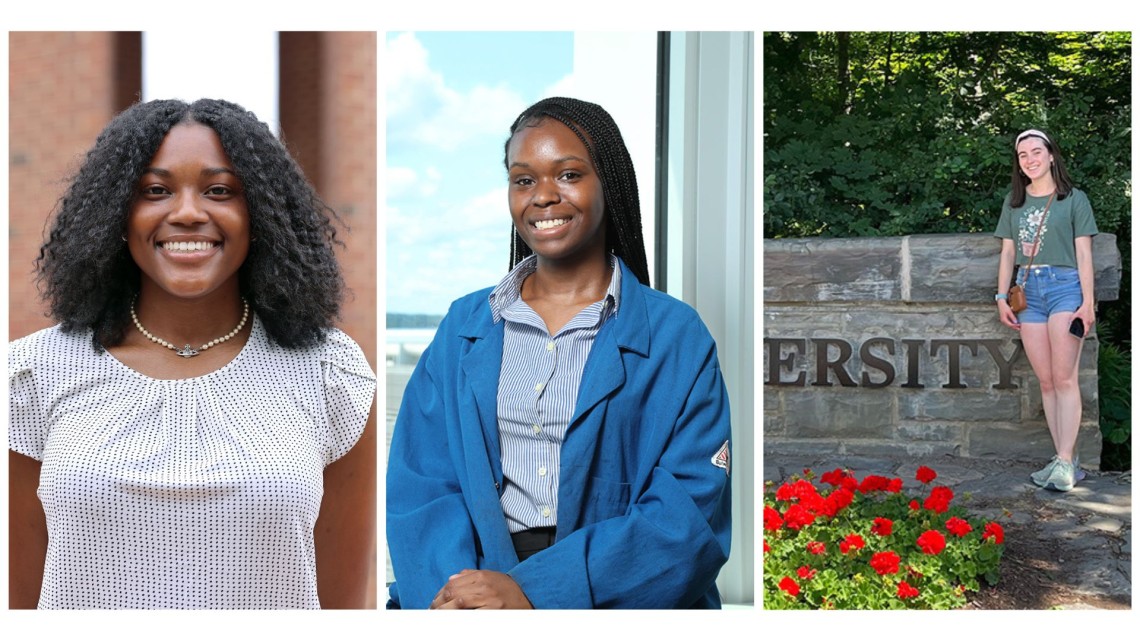
Kennedy Shorter, Sylvia Leggette and Nora McSwain are three of the 20 students who took part in the 2024 Research Experiences for Undergraduates (REU) program from the Center for Research on Programmable Plant Systems (CROPPS).
News directly from Cornell's colleges and centers
Students at CROPPS explore future of programmable plants
By Matt Hayes
This summer, a group of undergraduates explored the dynamic intersection of plant science and technology, gaining hands-on experience on how digital biology is shaping the future of agriculture and sustainability. The Center for Research on Programmable Plant Systems (CROPPS) is now celebrating their achievements by highlighting the work of three standout students who participated in research experiences at Cornell University, the Boyce Thompson Institute, and the University of Illinois Urbana-Champaign.
These three students — Sylvia Leggette, Nora McSwain and Kennedy Shorter — were among 20 participants in the 2024 Research Experiences for Undergraduates (REU) program at CROPPS, contributing to cutting-edge projects aimed at facilitating communication between people and plants. This year’s group is the largest cohort of undergraduate students CROPPS has trained, nearly triple the number of students from 2023.
CROPPS, a leader in the field of programmable plant systems, offers undergraduates the opportunity to explore the potential of 'starting a dialogue with plants' — a vision that merges plant biology with data science, engineering, robotics and social sciences. Over the summer, these budding scientists worked at Cornell’s Ithaca campus and the University of Illinois, collaborating with top researchers to push the boundaries of plant science and digital biology.
“CROPPS has incredible opportunities within its reach. Not only can we achieve the goal of a programmable plant, but we can also ensure that budding researchers from diverse backgrounds are part of its development,” said Darius Melvin, assistant director of diversity, inclusion, and partnerships for CROPPS. “Our REU program represents a unique avenue to broaden participation in transdisciplinary research among undergraduates from a multitude of educational backgrounds.”
Melvin noted that this year’s cohort includes students from community colleges, Historically Black Colleges & Universities (HBCUs), Minority-Serving Institutions (MSIs), R1 universities, and Ivy League schools.
“This is all intentional, as CROPPS is enacting a core belief that everyone has a place in transdisciplinary research, and that their unique perspectives contribute to optimal outcomes,” Melvin said.
The students worked on a variety of ambitious projects, from programming plant growth and communication to using advanced laser techniques to improve plant regeneration.
Leggette, from Tuskegee University, who worked in labs of professors Rob Shepherd at Cornell and Joyce VanEck at BTI, reflected on the interdisciplinary nature of the program. “At CROPPS, we’re blending plant sciences, microbiology, robotics, and data science in ways I never imagined. It’s thrilling to think about the future possibilities.”
Shorter, a student from North Carolina A&T University, who conducted her research at the University of Illinois Urbana-Champaign, was inspired by the societal implications of the work. “The potential of programmable plants to address issues like environmental sustainability and food security is incredibly exciting. I’m particularly interested in how these innovations can uplift marginalized communities,” she said.
McSwain, from Boston College, emphasized the urgency of finding innovative solutions in response to climate change. “As the demand for crops increases, along with the frequency and duration of droughts, it is essential to develop crops with improved water uptake efficiency,” she said.
By training the next generation of researchers to envision a future where plants and technology communicate seamlessly, CROPPS is cultivating a community of forward-thinking scientists prepared to tackle global challenges.
The 20 students from this year’s CROPPS cohort come from 19 universities and colleges from around the country, including Boston College, Brown University, Colgate University, Cornell University, Drake University, Fort Lewis College, Harvard University, North Carolina A&T State University, Phoenix College, Prairie View A&M University, Purdue University, Reed College, Rice University, Rochester Institute of Technology, Texas A&M University, Tuskegee University, University of Hawaii, and University of Illinois Chicago, and University of North Carolina Chapel Hill.
Applications for the 2025 REU program will be open later this fall. For more details, visit the CROPPS website.
Media Contact
Get Cornell news delivered right to your inbox.
Subscribe
